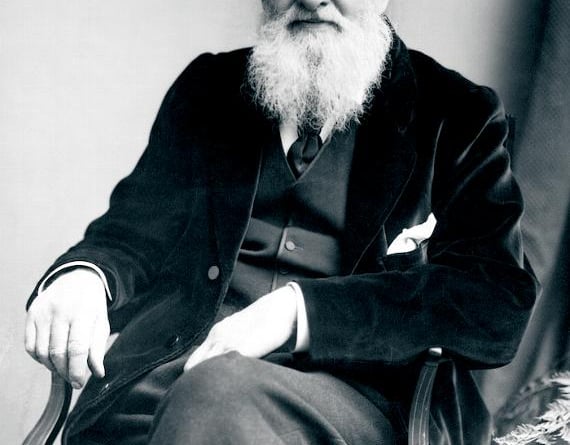WITH plans for a statue in Usk threatening to be scuppered by safety fears, the Chronicle’s Tim Butters takes a look behind the bronze and finds out who was Alfred Russel Wallace...
NOW while nearly everyone and their monkey has heard of Charles Darwin, the name Alfred Russel Wallace ranks low on the list of famous Brits who have changed the world.
For those in the know he is known, but for most, the question ‘Who is Alfie Wallace?’ Would be the cranium busting question you really don’t want when trying to win big on Who Wants To Be A Millionaire.
So dim the slights, set the scene, and let’s play.
For £64,000 is Mr Wallace better known a - A. Braveheart’s Dad. B. A UKIP Candidate. C. A fictional character from an Agatha Christie novel. Or D. A Monmouthshire scientist who never really received his due?
The answer is of course D.
Old Wallace was an Usk boy who earned worldwide fame and challenged everything hitherto believed with his groundbreaking concept of evolution.
Well perhaps in an alternative universe he did, in this one he’s known as a curious character who lurks on the fringes of Darwin’s 1859 book On The Origin of Species - the Victorian bestseller in which Charlie boy makes the case for our ancestors being apes and gives the hard sell on the theory of natural selection.
Here’s what really went down.
Completely independent of Darwin but roundabout the same time, Alfred Wallace was also busy formulating this own theory of evolution by natural selection.
They say lightning never strikes twice. Well in this case it did.
Now while Darwin spent five years sailing around the world, studying variation in plants and animals before he hit upon the idea that all species have evolved from simple life forms, Wallace’s apple on the head moment was born of a fever in a ramshackle hut.
Laid low and ill on the island of Ternate, Wallace was in a bad way. Yet in amongst the sweat and shakes, the sick scientist had a moment of clarity. It dawned on the man from Monmouthshire that species evolved because the fittest individuals survived, reproduced, and passed on their top notch DNA to their offspring.
Wallop! Wallace knew he was on to something and wanted to share his grand idea with another scientist he knew would be interested in such a topic - Charles Darwin.
Putting pen to paper, Wallace wrote to the man who had been studying the same theory for 20 years but had done nowt with it.
Encouraged by one another’s vision and belief, both men presented their theories before a meeting of the Linnean Society where their work was well received.
Keen to beat the drop, Darwin published his book on the topic the very next year. An action which ensured his name, and his alone became the one households all over the world associated with the revolutionary theory.
Darwin was so impressed with Wallace’s work, that after the book was published he crowed, “Wallace could not have made a better short abstract! Even his terms now stand as heads of my chapters!”
Wallace was not put out by his friend’s fame or success. He refused to let the seething resentment of the modern malcontent poison his heart.
The opposite was indeed true. He professed to be Darwin’s greatest fan and thanks to his friend’s continued support, Wallace entry to the upper echelons of the scientific establishment was ensured.
While on paper, Darwin and Wallace’s ideas of evolution might appear similar, in latter years the two men were at loggerheads on one important issue - spirituality.
Wallace was of the opinion that natural selection cannot account for mathematical, artistic, or musical genius.
He believed that musings of a metaphysical nature, as well as the gift of wit and humour could only be explained by one thing and one thing only - the eternal soul.
Wallace believed that “the unseen universe of Spirit” had acted three times throughout history to give us a helping hand. The first was the creation of life itself, the second was the development of consciousness, and the third and final part of the hat-trick was to endow mankind with a higher state of reason. Wallace also keenly believed that the raison d’être of the universe was not survival of the fittest but the development of the human spirit.
Wallace was also a strident social activist and in the 1890 article ‘Human Selection’ he wrote, “Those who succeed in the race for wealth are by no means the best or the most intelligent.”
In an 1899 essay Wallace also declared that, “All modern wars are dynastic; they are caused by the ambition, the interests, the jealousies, and the insatiable greed of power of their rulers, or of the great mercantile and financial classes which have power and influence over their rulers; and that the results of war are never good for the people, who yet bear all its burdens.”
It would appear in latter life, Wallace grew more and more jaded with the world and was a harsh and unforgiving critic of society’s ‘evolution’.
Before his death on November 7, 1913, Wallace was quoted in an Abergavenny Chronicle from January of that year as saying, “Now I have lived nearly a 100 years. During that time what can be said of our social environment? What progress has been made? In every detail of that ‘progress’, throughout all the great mercantile and manufacturing operations, there has been nothing but the most abominable vice going one - every kind of cruelty to the poor and to the children vying with the other; adulteration everywhere in every commodity, and lies everywhere.
“Everything is as bad as it can possibly be. There is not a single industry that has not to be inspected rigorously in order to see that the producer does not cheat his customer, or poison his employees, or work them to death in unwholesome factories. There exist in our midst horrors that were never known before. Still, nothing is ever done. And therefore I declare that from top to bottom our whole social environment is rotten, full of vice, and everything that is bad.”




